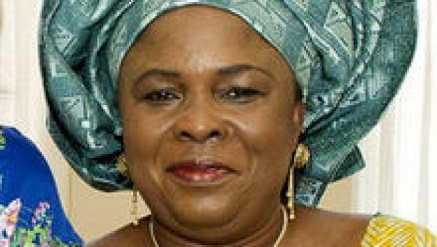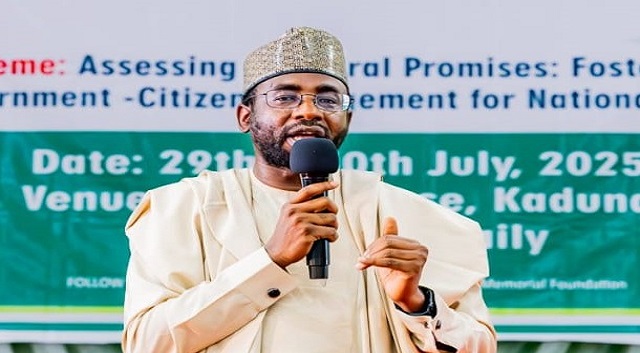General News
President GEJ is “Messiah” Says Wife

Dame Patience Goodluck, wife of the President, has said that her husband was the messiah and urged Nigerian women not to vote for Muhammadu Buhari, the presidential candidate of the All Progressives Congress (APC).
Mrs. Jonathan who spoke at the Peoples Democratic Party’s (PDP) women presidential rally Tuesday in Ilorin, Kwara State, said that “God has brought down the messiah for us. And PDP is the messiah. Goodluck is the messiah”
She asked Buhari to leave politics and governance to younger people.
“I am a person that will tell the truth. I will not abuse people, but if you are old you are old, so leave it to younger people,” she said in a veiled reference to her husband’s main challenger, whom the PDP had said was too old to occupy the President’s office” she stated.
The President’s wife likened the opposition APC to an “expired and adulterated drug” and urged the Nigerian electorate not to vote for the party, saying it could lead to their death.
She said God had told her that the APC would lose the general elections rescheduled for March 28 and April 11 general elections.
Mrs. Jonathan said, “What are we going to take expired drug to do? Have you seen anywhere where APC cured any person? If you vote and drink it and die, it is not my business. Do not go near APC. It is an expired drug and an adulterated drug.”
She said the Jonathan-led Federal Government had positively transformed the country through provision of massive infrastructure as well as good and functional health care and good educational system.
She also promised that the PDP would reclaim governance of Kwara State, saying the state was stolen from the PDP.
“They stole our mandate. This is opposition state. All these provisions of the Federal Government, they are claiming that they are the ones providing them, meanwhile they are embezzling the money.
“Anyone that comes, they eat it up. This time, PDP says no to them.”
General News
Nigeria Sends Egusi, Others to Space @ NASA’s Crew-11 Mission Launch

National Space Research and Development Agency (NASRDA) said that Nigeria participated National Aeronautics and Space Administration (NASA’s) Crew-11 Mission, which launched yesterday from the Kennedy Space Center in Cape Canaveral, Florida, the United States.

According to NASRDA, the NASA’s Crew-11 Mission had on board six indigenous Nigerian crop seeds: melon (otherwise Egusi), okra, cowpea, guinea corn (sorghum), amaranth and maize.
NASRDA said that the seeds were chosen for their nutritional and agricultural significance.
NASA is an independent agency of the US federal government responsible for the United States’s civil space program, aeronautics research and space research.
The agency said, “The mission, which features the World Seeds Payload, is a pioneering international agricultural experiment led by Jaguar Space, with contributions from 11 countries, including Nigeria.
“The seeds will be studied aboard the International Space Station, ISS, under microgravity conditions to explore their behaviour, resilience, and potential in future space-based farming, critical research aimed at addressing climate resilience, global food security, and agricultural innovation beyond Earth.
“Representing Nigeria at the launch is Olayinka Fagbemiro, assistant director, nternational Cooperation, NASRDA, and Linkages and project lead on the initiative.
“She oversaw every stage of Nigeria’s participation, from seed selection to logistics and formal international engagement.
“This is our first biological payload aboard a crewed NASA mission to the ISS.
“It not only validates years of local research on plant life in simulated space environments but also underscores NASRDA’s growing role in global scientific collaboration. This mission exemplifies inclusive, culturally grounded space research, and highlights the leadership role that emerging space nations such as Nigeria can play in shaping humanity’s future beyond Earth.”
yond Earth.”
General News
AfDB Approves $46m to Transform Healthcare in Sokoto State

The Board of Directors of the African Development Bank Group (AfDB) has approved a $46 million loan to finance the Sokoto State Health Infrastructure Project, a transformative initiative designed to enhance healthcare access and quality in Nigeria’s Sokoto State.

The project addresses critical health system gaps in Sokoto, where key indicators reflect a critical need for intervention. Only one in 20 children is fully vaccinated, while infant mortality stands at 104 deaths per 1,000 live births, nearly double Nigeria’s national average of 63.
Less than 14 percent of health facilities in the state have functional infrastructure, and there is just one doctor for every 8,285 people — far below the World Health Organization’s recommended ratio of 1:1,000.
The Bank’s financing will support the delivery of climate-smart health infrastructure across three levels of care. These include the construction and equipping of a 1,000-bed teaching hospital complex; three zonal hospitals with a combined capacity of 450 beds; and six primary healthcare canters strategically located to serve rural communities.
The project also includes the rehabilitation of health training institutions and the development of a modern medical warehouse to strengthen pharmaceutical supply chains.
“This investment illustrates our commitment to continue working with the Government to fill critical infrastructure gaps in Nigeria’s health system while building resilient, climate-adapted healthcare facilities,” said Abdul Kamara, director general of the African Development Bank’s Nigeria Office. “By strengthening healthcare infrastructure in Sokoto State, we are building hope and creating pathways to better health outcomes for millions of Nigerians.”
Aligned with Nigeria’s National Development Plan (2021-2025) and the Health Sector Renewal Investment Initiative, the project is expected to generate approximately 2,500 jobs, with 60 percent of opportunities targeting youth and 30 percent women.
In addition, the project will integrate electronic health infrastructure and renewable energy systems, ensuring sustainable, energy-efficient operations while reducing greenhouse gas emissions. Expanded capacity in local the medical and nursing schools will create 700 new training slots annually, helping to address the region’s acute shortage of skilled health professionals.
The initiative builds on the Bank’s successful track record in Nigeria’s health sector, where it has financed four health infrastructure projects totaling $117.68 million. It will leverage strategic partnerships with the United Nations Children’s Fund, the World Health Organization, USAID, and other development actors to maximize impact and ensure comprehensive health system strengthening.
The African Development Bank Group remains committed to enhancing the quality of life for Africa’s people through targeted investments in resilient health infrastructure that drive inclusive growth and sustainable development across the continent.
General News
NITDA DG says Nigeria’s Digital Economy Will Empower Citizens, Bridge Divides, and Drive Unity

Kashifu Inuwa Abdullahi, CCIE, the Director General of the National Information Technology Development Agency (NITDA), has reiterated the Federal Government’s commitment to deepening digital literacy, accelerating innovation, and expanding technology infrastructure as key drivers of inclusive national development.

Inuwa said this while delivering an address at the 2-Day Interactive Session on Government–Citizens Engagement, organised by the Sir Ahmadu Bello Memorial Foundation at the iconic Arewa House in Kaduna.
Themed “Assessing Electoral Promises: Fostering Government Engagement for National Unity,” the forum convened high-level stakeholders in government, civil society, academia, and policymakers to reflect on the progress of the Renewed Hope Agenda of President Bola Ahmed Tinubu, particularly in the area of governance delivery and citizen inclusion.
Speaking at the event, Inuwa emphasised that digital transformation is not only central to achieving the eight priority areas outlined by President Tinubu, but also foundational to uniting the country through equitable access to opportunities.
He described the digital economy as a cross-cutting enabler capable of enhancing productivity across all sectors, from agriculture and education to healthcare and financial services.
According to him, “Digital technology is not a vertical sector, it is pervasive and foundational. It powers everything else and provides a framework for inclusive growth.”
The NITDA boss outlined the Agency’s strategic focus around three key pillars: human capital development, digital infrastructure, and innovation-driven entrepreneurship, noting that the Renewed Hope Agenda had brought renewed vision and energy to Ministries, Departments, and Agencies (MDAs), enabling them to act in concert and foster stronger trust between government and the private sector.
On human capital, he noted that Nigeria’s greatest resource is its people, and developing digital skills at scale is crucial to unlocking that potential. Through initiatives such as the 3 Million Technical Talent (3MTT) programme and the Digital Literacy for All campaign, NITDA has trained over 350,000 individuals in Northern Nigeria since 2023. He explained that the goal is to ensure that by 2027, more than 70 percent Nigerians would have attained basic digital literacy.
To achieve this, Inuwa said NITDA is working closely with the Federal Ministry of Education to embed digital skills into the formal education system from kindergarten to tertiary level. He added that partnerships with the National Universities Commission (NUC) are ongoing to ensure digital literacy becomes part of the general studies curriculum across Nigerian universities.
In addition, NITDA is collaborating with the National Youth Service Corps (NYSC) to train of corps members annually, who in turn serve as digital literacy champions, taking technology skills into rural communities and informal sectors.
Highlighting infrastructure as another critical area, Inuwa announced that the Federal Government had approved the deployment of 90,000 kilometers of fiber optic cables across the country to expand broadband penetration.
He also stated that three digital centres are currently being built in each state to ensure that underserved and unserved communities can participate meaningfully in the digital economy. Northern Nigeria, with its wide coverage and developmental needs, is expected to benefit immensely from this rollout. So far, 13 IT Community Centres, 101 Digital Economy e-learning Centres and One Cybersecurity Research Centre were established in the last two years.
He also disclosed that the conducive investment climate fostered by President Tinubu’s reforms has sparked renewed interest from global technology companies, with tech giants such as Google and Microsoft bringing significant investments in Nigeria.
Inuwa announced that Nigeria would host two major global technology events in the coming months, GITEX Nigeria in September and the United Nations’ ICT for Governance (ICEGOV) Summit in November—both of which are expected to attract global innovators and investors.

 E-Financial2 days ago
E-Financial2 days agoEcobank Sends Important Notice for Customers

 News2 days ago
News2 days agoKenya Tops Global Rankings for ChatGPT Use

 Telecom2 days ago
Telecom2 days agoYele Okeremi charges government to take the lead to make Nigerian fintech attain global leadership

 E-Business2 days ago
E-Business2 days agoGoogle Announces $37m Funding in Africa

 Telecom2 days ago
Telecom2 days agoAliyu Aboki, WATRA Executive Secretary Champions Regulatory Harmonisation to Unlock West Africa’s Digital Economy

 E-Financial2 days ago
E-Financial2 days agoCBN Explains Mass Redeployment of Staff

 Telecom2 days ago
Telecom2 days agoNIMC Migrates Telcos to NINAUTH Platform

 General News2 days ago
General News2 days agoAirtel Nigeria Celebrates Workforce Milestones



























